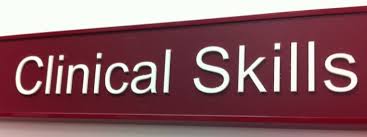
Our Clinical Skills Programme has a broad mandate: to facilitate the learning of essential clinical skills throughout the Faculty of Health Sciences. Though our undergraduate medical students constitute our major target, we are increasingly positioning ourselves to assist both the allied professions, postgraduate students, specialists in training and established practitioners.
We therefore need to cater for a vast range of skills, from clinical examination to laparoscopic surgery; must be relevant to the needs of the various health professions, from speech therapists to gynaecologists, and must cater for the requirements of professionals at any level of training and experience, from the student in his or her first year of study, to the experienced practitioner wishing to learn or revise advanced skills. For this reason, we have constituted ourselves as a group of closely related modules. Each module concentrates on a particular area of skills training, making this available to any health professional at any level of experience. The modules will be physically sited where most convenient for students, patients and tutors. All modules will however retain a common identity, with a single governing structure and director, and a uniform philosophy of education and repertoire of educational techniques.
For undergraduate students, many such skills are necessary. Our young health professionals need training and practice in communication skills, so that they can make optimal use of the opportunities offered for communication with patients; not only in terms of taking a history appropriate to the making of a diagnosis, but also to develop the sensitivity required to understand the patient as a person, and to inform, encourage, teach and provide emotional support for their patients.
An important part of the training of any health professional is learning to examine his or her patient in order to make a diagnosis. Our students are given a rigorous training in clinical examination, learning to assess patients quickly, accurately and with as little discomfort as possible. They also learn to use ancillary diagnostic equipment such as the otoscope and ophthalmoscope.
Most importantly, our students need to learn how to perform diagnostic and therapeutic procedures on their patients. For the medical student and nurse, this includes, among many other skills, taking blood, establishing an intravenous infusion, resuscitation and catheterisation; occupational therapists, physiotherapists and speech therapists have their own necessary repertoire of skills. For medical students in particular, training in these skills was sadly neglected in the traditional medical curriculum, young doctors largely being left to learn these skills informally, and a major motivation for our Clinical Skills Centre is the realisation that this undesirable practice is fair neither to patients nor to the professionals themselves.
The health professional, nurse, doctor, occupational therapist, speech therapist or physiotherapist, can never stop learning new skills. Not only is it impossible to learn every necessary skill during one's undergraduate years in University, but as circumstances change, so it is necessary to learn new skills appropriate to those circumstances. Thus, the young doctor, fresh out of medical school and about to begin work in a country hospital, will be exposed to situations and responsibilities requiring a wider range skills, and quite possibly with less supervision, than he or she required while working in in our teaching hospitals as a student. He or she may be required to carry out complex procedures on his or own responsibility. Obvious examples include surgical operations and anaesthetics and dealing with severe trauma: even diagnostic skills will have to be of a high standard to allow for confidence and self-sufficiency in the absence of specialist supervision. All modules of the Clinical Skills Centre will offer flexible courses to recent graduated health professionals to enable them to meet these challenges safely, effectively and comfortably.
Another category of health professional who will benefit from the Clinical Skills Centre are those specialising within a particular discipline. Registrars -- medical specialists in training, and professional nurses specialising in midwifery or intensive care nursing, are two examples of health professions requiring effective training in specific skills, deeper and more narrowly focussed than those they received during their undergraduate education.
Finally, the Clinical Skills Centre offers a resource to the community by offering the opportunity for continuing professional development for all health professionals, by offering courses designed to allow graduates at any level to revise old skills or learn and perfect new skills. (On the left, qualified surgeons practice the techniques of laparoscopic surgery during an advanced surgical skills training course.)